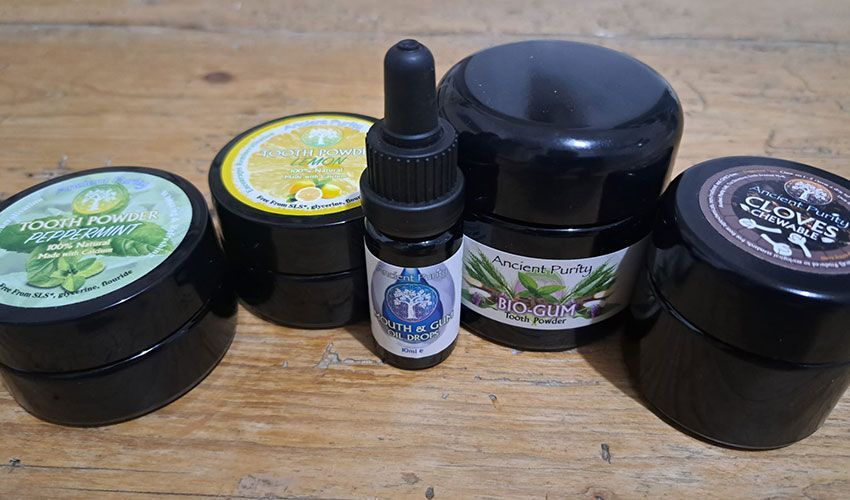Natural Health in Oral Care: Tooth Powders
In the oral hygiene world, innovations are continually emerging to elevate the standard of dental care. While toothpaste has long been the go-to choice for maintaining dental health, tooth powders are gaining traction as a potent alternative. From their natural ingredients to their effectiveness in cleaning teeth, tooth powders offer a myriad of benefits that make them a compelling addition to any oral care routine.
Before we dive deep into ‘alternative’ oral hygiene methods I’d like to bring your awareness to the potential dangers of using products that contain fluoride, so that when it comes to making decisions on what route to take, this information can hopefully aid you in your decision making process. Making this switch is just one of the many ways to aid our overall well-being in the long term, so it’s definitely an avenue worth exploring. Let’s get straight to it.

Dangers of Fluoride
Fluoride has long been a controversial ingredient in toothpaste, with debates surrounding its safety and efficacy. While fluoride is widely recognised for its ability to prevent tooth decay and strengthen enamel, some concerns have been raised regarding its potential dangers, particularly when consumed in excessive amounts. Here are some of the perceived risks associated with fluoride in toothpaste:
1. Dental Fluorosis:
One of the most well-known risks associated with fluoride is dental fluorosis, a condition that affects the appearance of tooth enamel. Dental fluorosis occurs when children consume excessive amounts of fluoride during the tooth-forming years, typically from birth to around age eight. This overexposure to fluoride can result in white streaks or spots on the teeth, and in severe cases, may lead to brown discoloration or pitting of the enamel. While dental fluorosis is primarily a cosmetic concern and does not typically affect oral health, it can cause self-esteem issues for affected individuals.
2. Skeletal Fluorosis:
In areas where drinking water is naturally high in fluoride or where fluoride is added to water supplies, there is a risk of skeletal fluorosis. This condition occurs when excessive fluoride accumulates in the bones over time, leading to stiffness, joint pain, and skeletal abnormalities. Skeletal fluorosis is more commonly seen in regions with naturally occurring high levels of fluoride in drinking water, but excessive consumption of fluoride from other sources, including toothpaste, can contribute to its development.
3. Neurotoxicity:
Some studies have suggested a potential link between fluoride exposure and neurotoxicity, particularly in children. Research has raised concerns that high levels of fluoride intake may impair cognitive development and contribute to neurological disorders such as ADHD (attention deficit hyperactivity disorder) and lower IQ levels. While the evidence is not definitive, ongoing research is exploring the potential neurotoxic effects of fluoride exposure.
4. Endocrine Disruption:
Fluoride has been implicated in disrupting the endocrine system, which regulates hormone production and function in the body. Some studies have suggested that fluoride may interfere with thyroid function by inhibiting the production of thyroid hormones or altering their activity. Thyroid hormones play a crucial role in metabolism, growth, and development, and disruption of thyroid function can have widespread health implications.
5. Fluoride Poisoning:
Ingestion of large amounts of fluoride, whether from toothpaste, mouthwash, or other sources, can lead to fluoride poisoning. Symptoms of fluoride poisoning include nausea, vomiting, abdominal pain, and in severe cases, convulsions and cardiac arrhythmias. While fluoride-containing toothpaste is generally safe when used as directed and spit out after brushing, accidental ingestion, particularly by young children, can lead to fluoride toxicity.
While fluoride is widely regarded as a valuable tool in preventing tooth decay and promoting oral health, it is essential to be aware of the potential risks associated with its use, particularly in excessive amounts. Practicing proper oral hygiene, using fluoride-containing toothpaste in moderation, and supervising children's toothbrushing habits can help mitigate the risks while maximising the benefits of fluoride for dental health. It is helpful to have all the information and facts when doing our own research into how we can limit our exposure to toxins, so I hope this can shed some light in your own research.
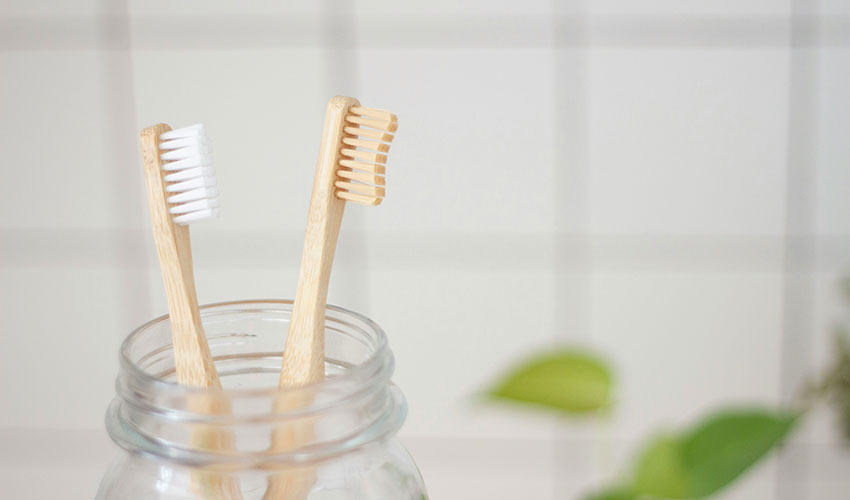
Benefits of Tooth Powders for Oral Care
Below are a myriad of reasons why making the switch is a worthy cause to both you AND the environment:
1. Natural Ingredients:
One of the primary draws of tooth powders is their natural composition. Unlike many conventional toothpaste brands that contain synthetic chemicals and additives, tooth powders typically consist of all-natural ingredients. Common components include baking soda, activated charcoal, calcium carbonate, and essential oils such as peppermint or tea tree oil. These ingredients are known for their antimicrobial, antibacterial, and cleansing properties, making them effective in combating plaque, bacteria, and bad breath.
2. Gentle Abrasiveness:
Tooth powders are often lauded for their gentle abrasiveness, which helps to remove surface stains without eroding tooth enamel. Unlike some toothpaste formulas that contain harsh abrasives, such as silica, tooth powders utilise finer particles that gently polish the teeth without causing damage. This makes them suitable for individuals with sensitive teeth or those concerned about enamel erosion.
3. Effective Plaque Removal:
The abrasive nature of tooth powders, combined with their natural ingredients, makes them highly effective in removing plaque buildup. Plaque, a sticky film of bacteria that accumulates on teeth, is a leading cause of tooth decay and gum disease. Tooth powders work to disrupt and dislodge plaque, preventing its accumulation and promoting a healthier oral environment.
4. Fresher Breath:
Many tooth powders contain essential oils with natural antibacterial properties, such as peppermint or tea tree oil. These oils not only impart a refreshing flavour but also help to combat the bacteria responsible for bad breath. By eliminating odour-causing bacteria, tooth powders leave the mouth feeling cleaner and fresher for longer periods compared to traditional toothpaste.
5. Environmentally Friendly:
In an era where environmental sustainability is increasingly prioritised, tooth powders offer an eco-friendly alternative to traditional toothpaste tubes. Most toothpaste tubes are made of non-recyclable plastic, contributing to environmental pollution. In contrast, tooth powders often come in recyclable or compostable packaging, reducing their environmental impact and promoting sustainability.
6. Versatility:
Another advantage of tooth powders is their versatility. While toothpaste typically serves a singular purpose, tooth powders can have multiple uses. They can be mixed with filtered water to form a paste-like consistency for brushing, or used in their dry form for a deeper clean or as a mouthwash by swishing with water. This versatility allows users to customise their oral care routine according to their preferences and needs.
7. Longevity:
Due to their dry formulation, tooth powders generally have a longer shelf life compared to traditional toothpaste. Without water-based ingredients, they are less prone to bacterial growth and degradation over time. This extended shelf life ensures that tooth powders remain effective and potent for a more extended period, reducing waste and ensuring value for money.
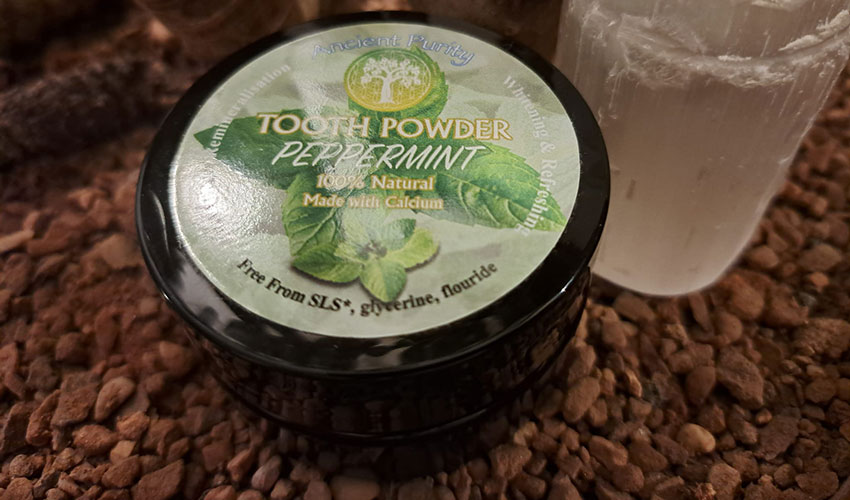
The Product Details
Peppermint Tooth Powder:
Peppermint tooth powder represents a refreshing and natural approach to oral hygiene, harnessing the power of peppermint essential oil along with other natural ingredients to promote a healthy mouth. You can check our peppermint tooth powder out here. Let's delve into the components and benefits of peppermint tooth powder:
Peppermint Essential Oil: At the heart of peppermint tooth powder lies peppermint essential oil, renowned for its refreshing flavour and potent antimicrobial properties. Peppermint oil contains menthol, which provides a cooling sensation and helps to freshen breath. Moreover, its antimicrobial properties combat bacteria in the mouth, contributing to improved oral hygiene.
Calcium Carbonate: Calcium carbonate, derived from natural sources such as limestone, contributes to the abrasive action of tooth powder while also remineralising tooth enamel. By replenishing calcium ions, calcium carbonate helps to strengthen teeth and prevent decay, promoting overall dental health.
Benefits of Peppermint Tooth Powder:
- Freshens Breath: The invigorating flavour of peppermint oil leaves the mouth feeling fresh and clean, providing long-lasting breath freshness throughout the day.
- Removes Surface Stains: The gentle abrasiveness of baking soda and activated charcoal helps to lift and remove surface stains caused by coffee, tea, and other staining agents, revealing a brighter smile.
- Promotes Oral Hygiene: Peppermint tooth powder effectively cleans teeth and gums, reducing plaque buildup and lowering the risk of cavities and gum disease.
- Natural & Sustainable: With natural ingredients and minimal processing, peppermint tooth powder offers a sustainable alternative to conventional toothpaste, free from synthetic chemicals and additives.
Lemon Tooth Powder:
Lemon tooth powder offers a refreshing and natural alternative for maintaining oral health, harnessing the cleansing and antibacterial properties of lemon along with other complementary ingredients. You can check our Lemon Tooth Powder out here. Let's explore the components and benefits of lemon tooth powder:
Ginger Root Powder: Ginger Root powder is a key ingredient in lemon tooth powder. Ginger is naturally rich in acids such as citric acid, gingerols, zingerone and malic acid (to name a few), which helps to break down plaque and remove surface stains from the teeth. Additionally, the acidity of Ginger contributes to creating an inhospitable environment for bacteria in the mouth, promoting oral hygiene.
Calcium Carbonate: Calcium carbonate, a naturally occurring mineral, contributes to the abrasive action of tooth powder while also remineralising tooth enamel. By replenishing calcium ions, calcium carbonate strengthens teeth and helps to prevent cavities, promoting overall dental health.
Salt (Optional): Some lemon tooth powder formulations may include salt for its antimicrobial properties and ability to enhance the cleaning action. Salt acts as a natural disinfectant, helping to inhibit the growth of bacteria in the mouth and promote gum health.
Lemon Essential Oil :Essential oils such as lemon oil, peppermint oil, or tea tree oil may be added to lemon tooth powder for their antibacterial and antifungal properties. These oils not only enhance the flavour but also contribute to the overall efficacy of the tooth powder in combating oral bacteria and promoting fresh breath.
Benefits of Lemon Tooth Powder:
- Natural Whitening: The citric acid in lemon powder helps to remove surface stains from the teeth, resulting in a brighter and whiter smile over time.
- Freshens Breath: Lemon tooth powder provides a refreshing burst of citrus flavour that leaves the mouth feeling clean and invigorated, promoting long-lasting breath freshness.
- Cleanses and Detoxifies: The cleansing properties of lemon powder effectively remove plaque and impurities from the teeth and gums, promoting oral hygiene.
- Antibacterial Protection: Lemon tooth powder creates an acidic environment in the mouth that inhibits the growth of bacteria, reducing the risk of cavities and gum disease.
- Gentle and Natural: With natural ingredients and minimal processing, lemon tooth powder offers a gentle yet effective alternative to conventional toothpaste, free from synthetic chemicals and additives.
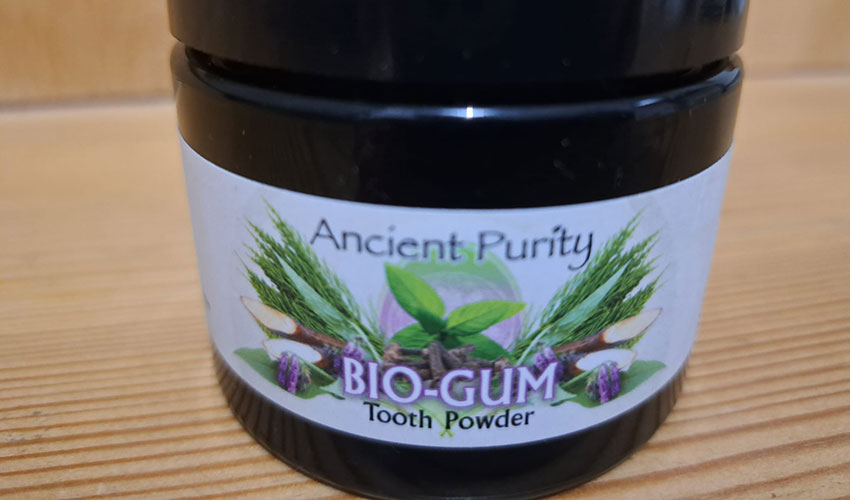
Bio-Gum Tooth Powder:
I have recently written an article ALL about Bio-Gum powder in particular. You can find this article here. Our Bio-Gum powder is made from comfrey root, oak bark, peppermint, horsetail and cloves, all ground together in store at Ancient Purity. As well as our Peppermint and Lemon tooth powder, Bio-Gum powder is an excellent alternative to traditional toothpaste. Check out the article linked above for a deep dive into this incredible product, and be sure to check out the product on our website, linked here.
Mouth & Gum Oil Drops:
As well as tooth powders we also have a mouth and gum oil! Mouth and gum oil drops offer a holistic and natural approach to oral care, harnessing the power of essential oils to promote healthy gums and fresh breath. These drops typically consist of a blend of essential oils known for their antimicrobial, anti-inflammatory, and soothing properties. You can check our mouth and gum oil drops out here. Let's explore the benefits and components of mouth and gum oil drops:
Essential Oils:
Mouth and gum oil drops contain a variety of essential oils carefully selected for their oral health benefits. Some of the essential oils found in our drops include:
- Tea Tree Oil: Renowned for its powerful antimicrobial properties, tea tree oil helps to combat oral bacteria and reduce inflammation in the gums.
- Peppermint Oil: Provides a refreshing flavour and a cooling sensation while freshening breath and soothing oral tissues.
- Clove Oil: Known for its analgesic and antiseptic properties, clove oil helps to alleviate toothache and reduce gum inflammation.
- Eucalyptus Oil: Exhibits antimicrobial and anti-inflammatory effects, promoting gum health and soothing oral discomfort.
Carrier Oils:
In addition to essential oils, mouth and gum oil drops may contain carrier oils such as coconut oil or almond oil. Carrier oils serve as a base for diluting the concentrated essential oils, making them safer for direct application to the gums and oral tissues.
Benefits of Mouth and Gum Oil Drops:
- Antimicrobial Action: The essential oils in mouth and gum oil drops possess potent antimicrobial properties that help to kill oral bacteria, preventing plaque buildup and reducing the risk of gum disease and tooth decay.
- Anti-inflammatory Effects: Many of the essential oils used in mouth and gum oil drops have anti-inflammatory properties that help to soothe irritated gums, reduce swelling, and promote healing.
- Freshens Breath: Peppermint oil and other minty essential oils provide a refreshing flavour and leave the mouth feeling clean and invigorated, promoting long-lasting breath freshness.
- Soothing Relief: Mouth and gum oil drops can provide relief from oral discomfort caused by conditions such as toothache, gum inflammation, or mouth ulcers, thanks to their analgesic and soothing properties.
- Easy to Use: Mouth and gum oil drops are convenient to use, requiring only a few drops to be applied directly to the gums or added to water for a refreshing mouthwash.
- Natural and Chemical-Free: Free from synthetic chemicals and additives, mouth and gum oil drops offer a natural and holistic alternative to conventional oral care products, making them suitable for individuals seeking a more natural approach to dental hygiene.
Incorporating mouth and gum oil drops into your oral care routine can help to maintain healthy gums, promote fresh breath, and provide soothing relief from oral discomfort, all while embracing the benefits of natural essential oils.
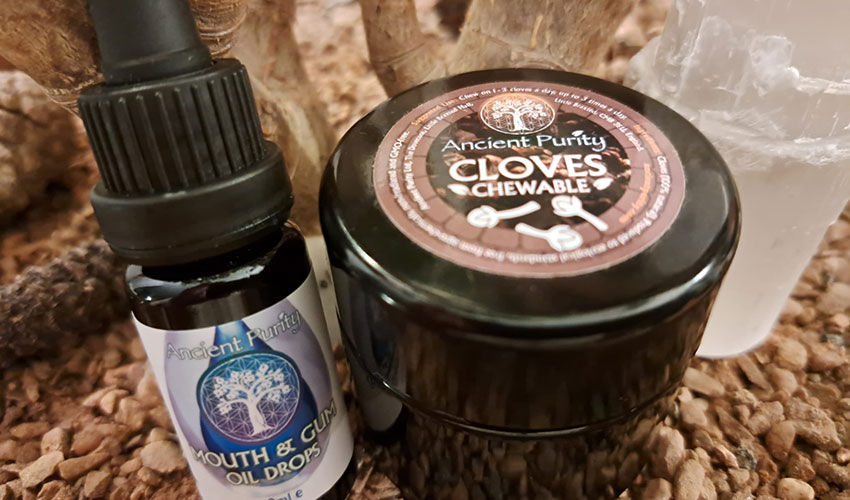
Chewable Cloves:
Chewable cloves, derived from the dried flower buds of the clove tree (Syzygium aromaticum), offer a natural and flavourful remedy for various oral health issues. Cloves have been used for centuries in traditional medicine for their antimicrobial, analgesic, and anti-inflammatory properties. Check out our chewable cloves here. Here's why chewable cloves can be beneficial for oral care:
Analgesic Properties:
One of the most well-known benefits of cloves is their ability to alleviate toothache and oral pain. Cloves contain eugenol, a natural compound with analgesic properties similar to benzocaine, a common ingredient in over-the-counter toothache remedies. Chewing on a clove releases eugenol, which can help numb the affected area and provide temporary relief from toothache.
Antimicrobial Action:
Cloves possess strong antimicrobial properties, making them effective in combating oral bacteria that contribute to plaque buildup, tooth decay, and gum disease. Chewing on cloves releases essential oils and compounds that inhibit the growth of bacteria in the mouth, promoting oral hygiene and reducing the risk of oral infections.
Anti-inflammatory Effects:
In addition to their antimicrobial properties, cloves have anti-inflammatory effects that can help reduce swelling and inflammation in the gums. Chewing on cloves or using clove oil may provide relief from gum pain, irritation, and swelling associated with conditions such as gingivitis and periodontitis.
Freshens Breath:
The aromatic compounds found in cloves impart a pleasant, spicy flavour and can help freshen breath. Chewing on cloves can temporarily mask bad breath and leave the mouth feeling clean and refreshed.
Oral Health Benefits:
Regular use of chewable cloves may contribute to improved oral health by reducing the risk of cavities, gum disease, and other oral infections. Incorporating cloves into your oral care routine can complement regular brushing and flossing, helping to maintain a healthy mouth and prevent oral problems.
How to Use Chewable Cloves:
To enjoy the oral health benefits of cloves, simply chew on one or two whole cloves for a few minutes, allowing the aromatic oils to be released. Alternatively, you can crush cloves and apply the powder directly to the affected area for localised relief from toothache or gum pain. It's essential to use cloves in moderation, as excessive consumption may cause irritation or sensitivity in some individuals. Discontinue use if you experience any numbness.
Incorporating chewable cloves into your oral care routine can provide natural relief from toothache, promote oral hygiene, and freshen breath, all while harnessing the power of this ancient spice for healthier teeth and gums.

As awareness of natural oral care products continues to grow, tooth powders are emerging as a compelling alternative to traditional toothpaste. With their natural ingredients, gentle abrasiveness, and effectiveness in cleaning teeth and promoting oral health, tooth powders offer a host of benefits for individuals seeking a more holistic approach to dental care. Whether you're concerned about chemicals in traditional toothpaste or simply looking to embrace a more sustainable lifestyle, tooth powders provide a viable solution for maintaining a healthy and radiant smile.





